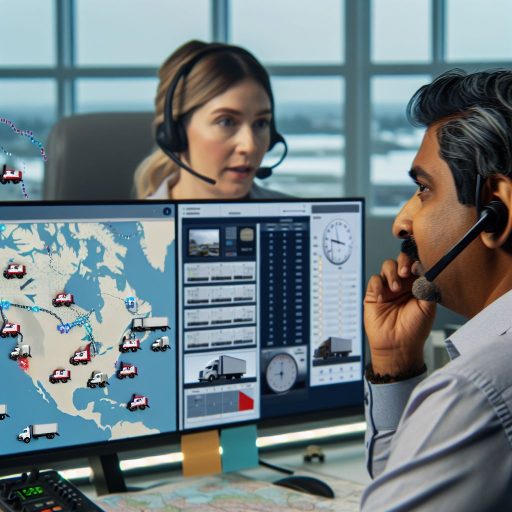Researching the Freight Forwarding Industry and Its Trends
Understanding the Basics of Freight Forwarding
Freight forwarding involves coordinating the shipment of goods.
Freight forwarders act as intermediaries between shippers and carriers.
They help navigate complex logistics and customs regulations.
Understanding these basics is crucial for interviews.
Staying Updated on Industry Trends
The freight forwarding industry is dynamic and constantly evolving.
Emerging technologies significantly impact logistics operations.
For instance, automation is making processes more efficient.
Additionally, sustainability is becoming increasingly important.
Companies are seeking eco-friendly shipping methods.
Identifying Key Players in the Market
Familiarize yourself with the major companies in freight forwarding.
Some notable names include DHL, FedEx, and Kuehne + Nagel.
Understanding their services and market positioning is beneficial.
Researching their recent initiatives can provide valuable interview insights.
Regulatory Environment and Compliance
The freight forwarding industry is heavily regulated.
Compliance with international trade regulations is essential.
Stay informed about changes in customs laws and tariffs.
Awareness of compliance challenges will prove advantageous in interviews.
Utilizing Online Resources and Databases
Leverage online resources to enhance your industry knowledge.
Websites like FreightWaves and Supply Chain 24/7 offer valuable insights.
Professional networking sites can also provide industry connections.
Consider joining freight forwarding groups to discuss trends.
Understanding the Role of a Freight Forwarder and Required Skills
Overview of Freight Forwarding
A freight forwarder acts as an intermediary between shippers and carriers.
They manage the logistics involved in transporting goods worldwide.
This role requires a deep understanding of trade regulations and shipping practices.
Moreover, it involves coordinating various transport modes, from air to sea.
Unlock Your Career Potential
Visualize a clear path to success with our tailored Career Consulting service. Personalized insights in just 1-3 days.
Get StartedAs a result, effective communication is essential for smooth operations.
Key Responsibilities of a Freight Forwarder
Freight forwarders handle documentation for international shipments.
They ensure compliance with customs regulations at every checkpoint.
Additionally, they provide tracking information to clients during transit.
Risk management is also a crucial aspect of their job responsibility.
Forwarders mitigate potential shipment disruptions through strategic planning.
Essential Skills for Freight Forwarders
Organizational Skills
Effective organization helps manage multiple shipments simultaneously.
It also ensures accurate documentation and timely deliveries.
Communication Skills
Strong communication skills foster collaboration with various stakeholders.
Clear communication avoids misunderstandings and enhances customer satisfaction.
Problem-Solving Skills
Freight forwarding often presents unexpected challenges.
Quick problem-solving abilities are critical for addressing issues on-the-fly.
Industry Knowledge
A solid understanding of logistics and supply chain fundamentals is necessary.
This knowledge allows freight forwarders to navigate complex regulations.
Moreover, staying updated on industry trends enhances their competitive edge.
Building Relevant Experience
Gaining hands-on experience through internships is beneficial.
It allows aspiring freight forwarders to understand operations better.
Networking with professionals in the industry can also provide valuable insights.
Preparing for Interviews
Researching the company and understanding their services is crucial.
Additionally, reviewing common interview questions can boost confidence.
Practicing articulate responses demonstrates preparedness during interviews.
Moreover, showcasing relevant skills can make a strong impression.
Preparing Commonly Asked Interview Questions in Freight Forwarding
Overview of Freight Forwarding Interviews
Freight forwarding interviews can be quite competitive.
Understanding the industry’s nuances gives you an advantage.
Employers look for candidates with specific skills and experiences.
Researching Common Interview Questions
Start by identifying frequently asked questions.
Typical questions often focus on logistics and regulations.
Consider questions about customs procedures as well.
Also, prepare for situational questions that assess problem-solving skills.
Practicing Your Responses
Practice answering each question aloud.
This helps build your confidence for the actual interview.
Consider conducting mock interviews with a friend or mentor.
Seek feedback on your answers to enhance your performance.
Demonstrating Relevant Experience
Use specific examples from your previous roles.
Highlight any experience with international shipping or customs compliance.
Emphasizing your knowledge of industry software can be beneficial.
Understanding Industry Trends
Stay updated on current freight forwarding trends.
Understanding new regulations shows your commitment to the field.
Familiarize yourself with emerging technologies in logistics.
Showcasing Soft Skills
Highlight your communication and negotiation skills.
These are critical in freight forwarding roles.
Furthermore, emphasize your ability to work under pressure.
Preparing Questions for the Interviewer
Always prepare questions to ask the interviewer.
This demonstrates your interest in the company and position.
Ask about company culture or growth opportunities.
Following Up After the Interview
Send a follow-up email thanking the interviewer.
Reiterate your interest in the position.
Additionally, mention a point from the interview to personalize your message.
Learn More: Canadian Maritime Pilot Training and Certification Path
Showcasing Your Experience with Import and Export Regulations
Understanding Import and Export Regulations
Import and export regulations govern international trade laws.
Familiarity with these regulations is crucial for freight forwarders.
Knowing the latest rules can set you apart from other candidates.
Awareness of trade agreements and tariffs is essential.
Each country has unique requirements to comply with.
Demonstrating Regulatory Knowledge
Be prepared to discuss specific regulations during your interview.
Highlight experiences handling customs documentation.
Explain how you navigated complex trade compliance issues.
Share examples where your knowledge led to successful shipments.
Use concrete metrics to illustrate your impact in previous roles.
Staying Updated with Changes
Regulations frequently change, impacting global logistics.
Demonstrate your commitment to continuous education.
Discuss seminars or courses you have attended on trade regulations.
Subscribing to industry newsletters shows proactive engagement.
Networking with professionals can also provide valuable insights.
Effective Communication Skills
Communication is vital when discussing regulations with clients.
Clearly explain complex regulations in understandable terms.
Practice articulating the importance of compliance in logistics.
Use examples to illustrate potential risks of non-compliance.
Good communication can build trust with clients and partners.
Leveraging Technology in Compliance
Modern technology simplifies regulatory compliance processes.
Familiarity with compliance software can enhance efficiency.
Discuss tools that automate documentation and reporting.
Highlight how technology has improved your workflow.
Being tech-savvy is an asset in the logistics industry.
Learn More: Challenges Maritime Pilots Face in Canadian Waters
Demonstrating Knowledge of Logistics Software and Technology
Understanding Logistics Software
Logistics software plays a critical role in freight forwarding.
It streamlines processes and enhances efficiency.
You must familiarize yourself with various types of logistics software.
Examples include TMS (Transportation Management Systems) and WMS (Warehouse Management Systems).
Each system has unique functions that support logistics operations.
Familiarity with Industry Tools
During interviews, demonstrate familiarity with industry-leading tools.
For instance, mention software like SAP, Oracle, or CargoWise.
Discuss how each tool can optimize supply chain management.
Moreover, understanding integrations with other platforms is beneficial.
Highlight experiences where you’ve utilized these tools effectively.
Staying Updated with Technology Trends
The logistics landscape evolves rapidly due to technology advancements.
Stay informed on current trends like blockchain and IoT.
Discuss how these technologies impact freight forwarding.
For example, blockchain enhances transparency and security in transactions.
Understanding these trends shows your commitment to industry growth.
Practical Applications of Technology
During interviews, provide examples of practical technology applications.
Describe a situation where software improved a logistics process.
Detail the challenges faced and the solutions implemented.
Quantify your results wherever possible to illustrate success.
These stories demonstrate your hands-on experience in freight forwarding.
Emphasizing Analytical Skills
Analyzing data is crucial in logistics operations.
Show your ability to interpret reports and metrics from software.
Discuss how analytics inform decision-making processes.
For instance, analyzing shipping costs can lead to better route planning.
Employing analytical skills positions you as a strategic asset.
Find Out More: Freight Forwarder’s Role In Canada’s Supply Chain
Highlighting Soft Skills
Importance of Communication
Effective communication is critical in freight forwarding interviews.
You must clearly articulate your thoughts and ideas.
Listening skills are equally essential in this role.
Begin by demonstrating active listening during the interview.
Respond directly to the interviewer’s questions with clarity.
Moreover, using industry-specific terminology can enhance your responses.
Show your ability to adjust your communication style to your audience.
For example, explain complex concepts in simple terms if necessary.
Problem-solving Skills
Freight forwarding often involves unforeseen challenges.
Interviews may present hypothetical scenarios to test your problem-solving skills.
Always approach these scenarios methodically.
First, identify the issue clearly and concisely.
Next, propose practical solutions based on your experience.
Finally, discuss the potential outcomes of your solutions.
This approach signals your analytical and critical thinking abilities.
Adaptability in a Dynamic Environment
The logistics industry is fast-paced and ever-changing.
Employers value candidates who can adapt quickly.
Share examples from your past experience demonstrating flexibility.
For instance, discuss a time when you adjusted to a last-minute change.
Highlight your ability to learn new processes and technologies swiftly.
Furthermore, express a willingness to embrace new challenges during the interview.
This shows you can thrive in a dynamic work environment.
Discover More: Importance Of Networking In Freight Forwarding Careers

Preparing Your Resume and Cover Letter for the Freight Forwarding Role
Tailoring Your Resume
Your resume must highlight relevant experience in freight forwarding.
Include specific keywords from the job description.
This approach helps your resume pass through applicant tracking systems.
Clearly outline your previous roles and responsibilities.
Focus on quantifiable achievements where possible.
For example, mention how you improved shipment efficiency.
Use bullet points for clarity and easy readability.
Ensure your contact information is up to date.
Writing an Effective Cover Letter
Your cover letter should complement your resume.
Start with a strong opening statement that captures attention.
Briefly explain your interest in the freight forwarding role.
Highlight your skills that align with the company’s needs.
Share an example of how you navigated a challenging shipping situation.
This demonstrates your problem-solving skills.
Conclude with a call to action for an interview opportunity.
Formatting and Style Considerations
Maintain a professional tone throughout your documents.
Use a clean, organized layout for both your resume and cover letter.
This enhances readability and presents you as detail-oriented.
Choose a clear font and stick to standard sizes.
Avoid excessive colors or graphics that distract from the content.
Finally, proofread carefully to eliminate typos and errors.
Practicing Effective Interview Techniques and Body Language
Understanding Common Interview Questions
Research common freight forwarding interview questions.
Prepare answers highlighting your relevant experience.
Be ready to discuss why you want to work in freight forwarding.
Additionally, anticipate questions about logistical challenges.
Utilizing the STAR Technique
Employ the STAR technique for structured responses.
Describe the Situation you faced in past roles.
Explain the Task you were assigned clearly.
Detail the Action you took to address the situation.
Finally, share the Result of your actions effectively.
Mastering Body Language
Your body language speaks volumes during interviews.
Make positive eye contact to show confidence.
Maintain an open posture to convey approachability.
Avoid crossing your arms; it may seem defensive.
Practice smiling naturally to create a welcoming atmosphere.
Practicing Active Listening Skills
Active listening is crucial in interviews.
Nod appropriately to show you are engaged.
Rephrase questions to demonstrate understanding.
Ask clarifying questions if needed for better comprehension.
This technique reflects your communication skills.
Mock Interviews for Preparation
Conduct mock interviews to enhance your skills.
Invite a friend to role-play as the interviewer.
Record your responses to review your performance.
Review body language and refine your responses.
Seek constructive feedback to make improvements.
Creating a Positive Interview Environment
Choose a quiet location for your interview.
Ensure technical equipment works properly for virtual interviews.
Dress professionally to make a great first impression.
Arrive early to demonstrate punctuality and enthusiasm.
Create a calm mindset before the interview starts.
Following Up After the Interview: Best Practices and Etiquette
Importance of Follow-Up
A timely follow-up demonstrates your interest in the position.
It reinforces your professionalism and commitment to the role.
Furthermore, it keeps you fresh in the interviewer’s mind.
Timing Your Follow-Up
Send your follow-up email within 24 to 48 hours.
This timeframe shows promptness without appearing pushy.
Consider the company’s work schedule when timing your message.
Crafting Your Message
Your email should express gratitude for the opportunity.
Be specific about what you enjoyed during the interview.
Reiterate your interest in the position and the company.
Cite any relevant points discussed during the interview.
Keeping It Brief
Maintain clarity and conciseness in your follow-up message.
Your email should not exceed a few short paragraphs.
Ensure each sentence communicates a clear purpose.
Providing Additional Information
Include any additional information that supports your application.
This could be a relevant experience or skill you forgot to mention.
A brief mention can strengthen your candidacy.
Proofreading Your Email
Always proofread your message before sending it.
Avoid any spelling or grammatical errors.
Consider asking a friend to review it for clarity.
Responding to Further Communication
Be prepared for any additional questions from the interviewer.
Respond promptly and thoughtfully to any follow-up requests.
This response can further demonstrate your enthusiasm.
Additional Resources
How to start my business in the Shipping industry involving freight …
JAS Worldwide | Freight Forwarding Services | International …




